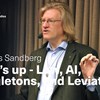computationally
Homophily and Insularity Dynamics in an Echo Chambers: Computational Models for the Study of the Conspiracy Subculture in Facebook
Social Indicators Research Abstract The research focuses on developing a computational model (agent-based) to describe and analyse the structure and evolution of a conspiracy bubble within Facebook. Thedescriptiveexperimental
Mass Reproducibility and Replicability: A New Hope
I4R Discussion Paper 107 Abstract This study pushes our understanding of research reliability by reproducing and replicating claims from 110 papers in leading economic and political science journals. Th
What is a social pattern? Rethinking a central social science term
Theory & Society Abstract The main aim of this article is to start a discussion of social pattern, a term that is commonly used in sociology but not specified or defined. The key question can be phrsociologicalconcept of social pattern may look like. A useful and theoretically solid concept of social pattern can in our view be constructed by basing it on Weber’s concept of social action. This means thatboththe behavior of the actorsandthe meaning these invest their behavior with must be taken into account. The article ends with a brief discussion of how to use the concept of social patterns in an effective way and what may endanger such a use.

Irina Vartanova
In my research, I use survey data, such as World Values Survey, to study social norms and their change in different cultures. At the Institute, I work with Pontus Strimling and Kimmo Eriksson on a project
The Complexity of Mental Integer Addition
in: Journal of Numerical Cognition, Volume 6 (1). AbstractAn important paradigm in modeling the complexity of mathematical tasks relies on computational complexity theory, in which complexity is measur
The refinement paradox and cumulative cultural evolution: Complex products of collective improvement favor conformist outcomes, blind copying, and hyper-credulity
PLOS Computational Biology Abstract Social learning is common in nature, yet cumulative culture (where knowledge and technology increase in complexity and diversity over time) appears restricted to huma
Modelling Social Mechanisms for Knowledge Generation & Exploration
Nanda Wijermans, Stockholm Resilience Centre Human behaviour is a complex phenomenon with a lot of open questions. Computational modelling can support the scientific quest for more understanding of hum
Research seminar with Anders Sandberg: Serf’s Up: Law, AI, Singletons and Leviathan
Venue: Institutet för framtidsstudier, Holländargatan 13, StockholmRegister hereWelcome to this research seminar with Anders Sandberg, Ph.D. in computational neuroscience, researcher at IFFS and Senior

Anders Sandberg: Serf's up - Law, AI, Singletons and Leviathan
Research seminar with Anders Sandberg, Ph.D. in computational neuroscience, researcher at IFFS and Senior Research Fellow at the Future of Humanity Institute, Oxford University. Abstract A key problem

Social norms and collective threats
Do social norms help dealing with collective threats? This project studies the behavior of people in the face of risk, and asks how social norms can motivate people to cooperate.








